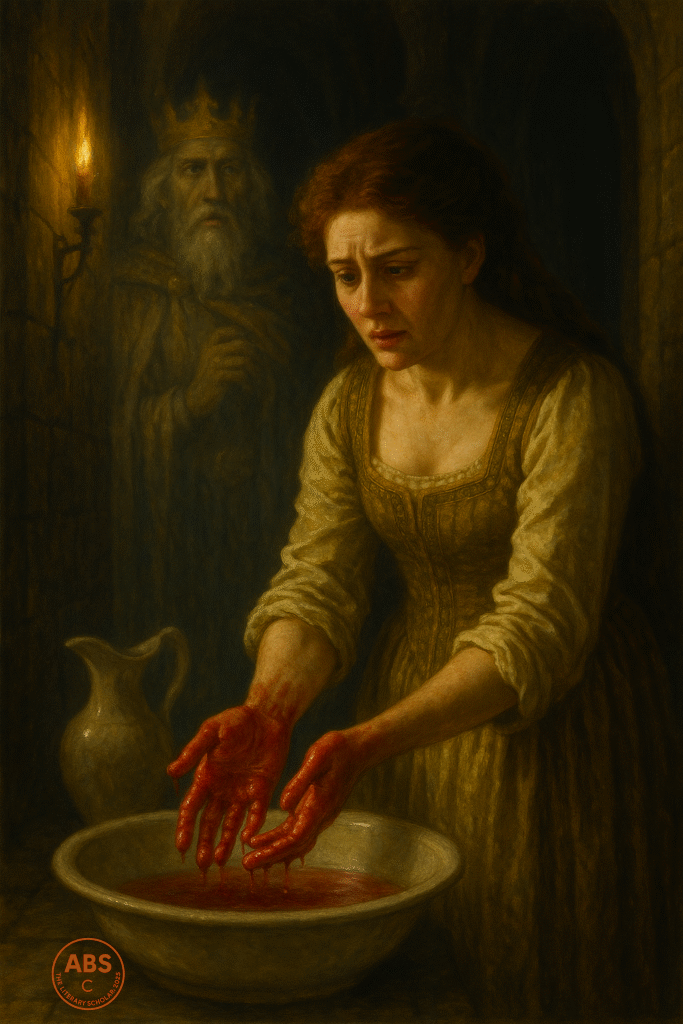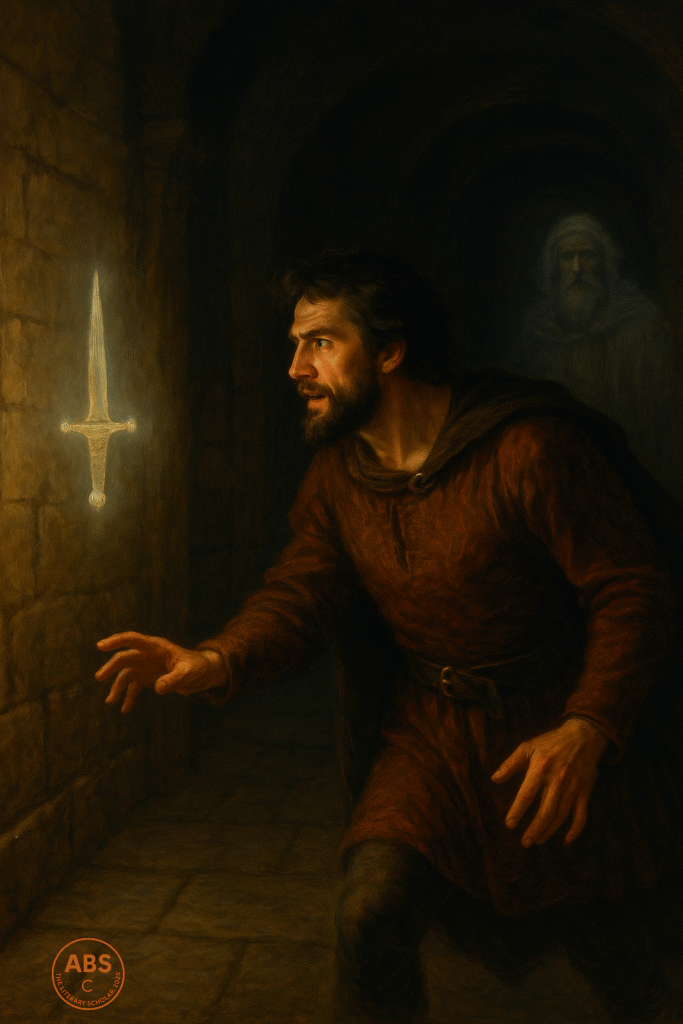By ABS, The Literary Scholar
(Who firmly believes that if guilt had a voice, it would quote Shakespeare with blood on its hands)
Once Upon a Gory Prophecy
Let us begin, as all good tragedies do, in a storm.
Thunder crashes. Lightning flashes. And somewhere on a war-torn heath in medieval Scotland, three witches huddle like a particularly wicked startup brainstorming doom. Macbeth and Banquo, two noble warriors, are returning victorious from battle when they encounter this creepy coven. And the witches—because subtlety is not their strong suit—greet Macbeth with:
“Fair is Foul, Foul is Fair” and those bloody prophesies….!
Which loosely translates to: You won’t be king, but your bloodline will dominate the Game of Thrones spin-offs.
Naturally, the prophecy sets the ball of doom rolling. Macbeth, already decorated with honors, starts to wonder: why wait for fate when you can expedite it with a dagger?
Lady Macbeth: Ambition in a Dress
Back at Inverness, Lady Macbeth receives a letter from her husband detailing the witches’ prophecy. Her reaction is not, “How strange!” but, rather: “Let’s murder the king and redecorate.”
She immediately calls upon dark spirits in what may be history’s boldest soliloquy for a woman denied a battlefield:
“Come, you spirits
That tend on mortal thoughts, unsex me here,
And fill me from the crown to the toe top-full
Of direst cruelty!”
One has to admire the woman’s clarity. While Macbeth dithers, she drafts blueprints for regicide.
When Duncan arrives for a royal slumber party, Lady Macbeth is the perfect hostess—with murder on the menu. Macbeth, full of doubt, tries to pull back, but Lady M, ever the motivator, questions his manhood, ambition, and possibly his choice of cologne.
The Dagger That Wasn’t There
Before committing the deed, Macbeth is visited by one of Shakespeare’s most chilling hallucinations:
“Is this a dagger which I see before me,
The handle toward my hand? Come, let me clutch thee.”
Poor Macbeth. He can no longer distinguish between what is and what is imagined. It’s not just a dagger—it’s ambition made visible, guilt made sharp. He follows this ghostly blade as if it were Google Maps leading him to hell.
He murders Duncan in his sleep. Lady Macbeth, who planned it all, has to return to the scene and smear the guards with blood, because Macbeth forgets to “frame” them. Rookie move.
“A little water clears us of this deed,” she says briskly.
Yes, well—try telling that to her later.
Kingship, Paranoia, and the Murder of Banquo
With Duncan gone, Macbeth takes the crown. But uneasy lies the head that wears it, especially when you’ve earned it by stabbing someone in their sleep. Macbeth now fears Banquo and his suspiciously prophesied heirs. He hires two murderers (and randomly, a third one who just shows up?) to kill Banquo and his son, Fleance.
Banquo dies. Fleance flees. (Yes, flees—Shakespeare rarely misses a pun.)
But Macbeth’s guilt won’t let the banquet go smoothly. At a royal dinner, Macbeth sees Banquo’s ghost sitting at the table. Only Macbeth sees him, of course, which leads to him screaming at an empty chair.
“Thou canst not say I did it: never shake
Thy gory locks at me!”
Everyone else is staring into their goblets, wondering if they missed something on the menu. Lady Macbeth tries damage control:
“Sit, worthy friends. My lord is often thus,
And hath been from his youth.”
Translation: This is just his little thing. Enjoy your pudding.
The Witchy Encore and the Walking Woods
Unhinged and hungry for assurance, Macbeth visits the witches again. This time, they summon apparitions like a supernatural PowerPoint presentation:
Beware Macduff.
None of woman born shall harm Macbeth.
Macbeth shall never be vanquished until Great Birnam Wood comes to Dunsinane Hill.
Macbeth relaxes. He thinks he’s invincible. After all, who isn’t born of a woman? And how could a forest possibly take a walk?
(Shakespeare, of course, has receipts.)
Lady Macbeth: The Sleepwalking Queen of Guilt
As Macbeth grows more confident in killing, Lady Macbeth begins to unravel.
Her famous sleepwalking scene is both poetic and painful. She roams the castle at night, rubbing her hands obsessively, trying to wash off invisible blood:
“Out, damned spot! Out, I say!”
She murmurs of Duncan, Banquo, and Macduff’s wife—all victims of ambition run amok. The woman who once called blood “a little water” now sees it everywhere. No water is enough. No prayer is left. No peace is possible.
She dies offstage—perhaps a suicide, the doctor implies. Shakespeare doesn’t give her a dramatic death. Just a quiet, ghost-like vanishing. A soul snuffed by the very flame she lit.
The Final Act: Truth, Trees, and Tragedy
As Macduff and Malcolm (Duncan’s son) march toward Macbeth’s fortress, they camouflage their troops with branches cut from Birnam Wood—thus, the forest does move.
“Let every soldier hew him down a bough
And bear’t before him.”
Macbeth is still clinging to prophecy clause two: “None of woman born…” Until Macduff appears and reveals the final twist:
“Macduff was from his mother’s womb
Untimely ripped.”
Born by C-section. Not “born” in the traditional sense.
And with that, prophecy folds like bad origami. Macbeth fights, but is slain. Justice is poetic. Scotland breathes again.
Macbeth: Not a Villain, But a Mirror
Let’s be clear—Macbeth is not your standard moustache-twirling villain. He’s not Iago. He’s not Richard III. He’s a tragedy. A good man poisoned by ambition, manipulated by fate, and eaten alive by guilt.
Lady Macbeth? She’s not just a “wicked wife.” She’s the emotional architecture of the entire play. The human embodiment of ruthless desire. And eventually, the price paid in sleepless nights and whispered sins.
The witches? Never lie. They simply watch. Perhaps they are fate. Perhaps they are us, when we want shortcuts to glory.
And so the play ends in a sea of blood, unwashed hands, and voices echoing in eternity.
ABS, the literary Scholar wipes the dust off the crown, folds the prophecy into a paper dagger, and places Lady Macbeth’s candle on the sill of remorse


Signed
ABS
The Literary Scholar
(Who believes that all great ambition should come with a ghost clause)
(Still wonders if Macbeth needed therapy more than a throne)
(And always double-checks whether a dagger is real before following it)
Share this post / Spread the witty word / Let the echo wander / Bookmark the brilliance
